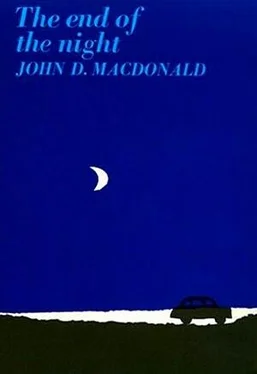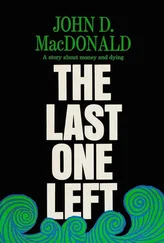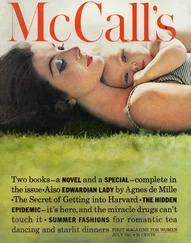Acting on emergency instructions, the Glasgow police made a street by street search of the area adjacent to the bowling alley, expanding the area until they found an abandoned red-and-white Chevrolet with Arkansas plates, the car which matched the description of the one involved in the Nashville killing.
Specialists went over the car with great care. The steering wheel and door handles had evidently been hastily wiped clean. The car had been driven hard and far and fast, with the oil at too low a level. The bearing surfaces were badly scored, the car sluggish and noisy. There was half a fresh thumbprint on the rear-vision mirror. In the rear ash tray were several cigarette butts clotted with a heavy, dark-red lipstick. There was an empty tequila bottle under the front seat with many prints smeared and overlapping, and a few relatively distinct ones. A small smear of lipstick on the neck of the bottle matched the lipstick on the cigarette butts. Wedged in the front ash tray was an empty folder of book matches from a motel in Tupelo, Mississippi. An agent was sent immediately to Tupelo.
By eight o’clock on Sunday night, Herbert Dunnigan went to the Grill Room of the Hotel Riggs for dinner, accompanied by a young agent named Graybo.
Dunnigan felt weary but reasonably content. “It’s beginning to unravel,” he said.
“There’s still no identification.”
“There will be. We’ll find out where the Arkansas Chev was stolen, and we’ll find the Ford wagon they took from that tile salesman, and that’ll give us a little more, just like the Chev did. And the motel in Tupelo will give us a little more, I hope. And when we make one of them, we’ll get a lead to the others, and then we’ll know all of them.”
“Do you think they’ve split up, sir?”
“Perhaps. But I don’t think it will make any difference in the long run. Somehow I don’t think they have.”
“Why not?”
“They’ve taken crazy chances. They think they’re invulnerable. Maybe one will get nervous and drop off. I think we’ll take them in a package.”
“It’s all so... pointless.”
“It’s all for kicks, Graybo. Four misfits. Unbalanced people, full of hostility. Something tipped the lid off. Maybe an accident. Maybe the tile salesman was an accident. And that set them off. From then on, what could they lose?”
“That was back last Tuesday, sir. And they’re still out there. It’s funny to think of them out there tonight. I wonder what they’re like. I wonder what they’re saying to each other. Unless we can get them — they’ll do something else.”
“Probably.”
“So that means there’s somebody walking around not knowing he’s going to run into those four.”
“You’ve got an active imagination, Graybo.”
The young agent colored. “I was just thinking out loud.”
“Don’t apologize. Imagination can be valuable. Police work can take you only so far. Then a good guess can be worth all the rest of it.”
“Sir, are you going to be able to talk to Kemp?”
“Who? Oh, the boy friend.”
“He’s been hanging around all day.”
“It won’t do any good. I... I guess I can spare the time.”
An agent named Stark came swiftly toward the table. Both men looked alertly at him as he sat down. “Bert, I think we’ve made the burly boy. Phoenix came through. We’ve got a good correlation on two print classifications, but it’ll take visual comparison to check it out. They’re wiring a mug shot we can check with the kids. He’s small-time. Ninety days last year for assault. Robert Hernandez. Unskilled laborer. The only thing that doesn’t seem to match up is the age. He’s only twenty, but Phoenix says he looks older. No address of record. No record of other convictions.”
“It sounds good enough so I think we should go ahead right now and check it out with the regional Social Security office and get...”
“I started that ball rolling, Bert.”
“Good enough!”
An hour passed before Dunnigan remembered Dallas Kemp. He checked and found out that Kemp was still waiting, so he had him brought in.
When Dallas Kemp finally met Herbert Dunnigan, he felt a sharp sense of disappointment which he hoped was not apparent to Dunnigan. Kemp was shrewd enough to realize that — perhaps through the conditioning of television and its all-wise, all-powerful heroes — he had expected to meet some sort of father image, some idealized, personalized version of law and order radiating supreme confidence.
But this was a rather clerical-looking man, not large, obviously weary, obviously troubled. He had an indoor pallor, nicotine stains on his fingers. The slight suggestion of a stammer contributed to the impression of ineffectualness.
“Sit down, Mr. Kemp. I c-can’t give you much time. I suppose you want reassurance. About the only assurance I can give you is that we’ll take them. Sooner or later. I don’t know what that’s worth to you.”
Dallas Kemp sat in the chair beside the desk. He sat down slowly. Ever since it had happened he was aware of performing all physical acts slowly and carefully. He felt as though any hasty movement would destroy his control, and he would fly into small pieces, or begin yelling and be unable to stop.
“You see,” he said, “we quarreled. The last time I saw her, we were scrapping.” He paused. “That isn’t what I meant to say to you.”
“I can see how that makes it worse for you.”
Kemp felt grateful to the man. He hoped the tears would not flood his eyes again. They were always there, a slight stinging sensation — always in readiness.
“I’m an architect.”
“I know. A good one, I’ve been told.”
“I like form and order. Grace and dignity.” He looked at his large hands, flexing the long fingers. “I can’t fit what’s happened into any frame of reference — into anything I know, Mr. Dunnigan. I guess I wanted to see you because I want to be told everything is going to be all right. I guess you can’t tell me that.”
“I could, but what would it mean?”
“I want to do something. It’s been twenty-four hours. I can’t just wait and wait. I want to be given something to do. Something that will help.”
“This isn’t a movie, Kemp. No chance for the hero to outwit the bad guys and rescue the girl. You have to wait. We all have to wait.”
“Do you know anything at all? Is there anything you know that you can tell me?”
Dunnigan hesitated, then handed Kemp a picture. It was on unusual paper, limp, glossy, yellowish.
“This is one of them,” Dunnigan said. “The two kids made a positive identification.”
The photograph was composed of tiny lines, as on a television screen. Some of the fines had not printed properly, but the face was clear enough, two shots, full face and profile.
It was a beast face, empty, unreachable, merciless.
Kemp tasted the sickness in his throat as he swallowed. “This — is one of them?”
“They beat and kicked and stabbed a stranger to death, Kemp. For no reason. What would you expect one of them to look like?”
“I... don’t know. Like this, I guess.” He handed the picture back. He smiled. It was a grimace of tension, not a smile. “There isn’t much Helen... or anybody could say to that kind of a person. She’s so outgoing. I’d thought that... if she had a chance to talk to them... but...”
“Get hold of yourself!”
“I... thanks.”
“It’s been twenty-four hours, Kemp. There’s no point in trying to kid you. Pray she’s alive. Pray they’ve kept her alive. They might do that. But if we get her back alive, she won’t be in good shape. Face that at least.”
“All right. But... damn it, it’s such a jungle thing. It’s out of the dark ages. A thing like that shouldn’t happen to her.”
Читать дальше







![Джон Макдональд - The Hunted [Short Story]](/books/433679/dzhon-makdonald-the-hunted-short-story-thumb.webp)


